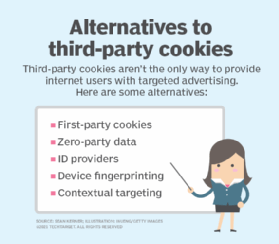
Getty Images/iStockphoto
Google debuts Topics, its latest third-party cookie replacement
Topics, a replacement for browser tracking cookies, is Google's latest idea to preserve browser privacy while preserving the value of its digital ad platform.
Google Topics is the latest proposed idea to replace third-party cookies for digital advertisers in the world's most used web browser. The search giant plans to launch a developer trial by the end of the quarter.
Topics is an API that aspires to serve advertisers anonymized groups of Chrome users with similar interests, based on their browsing activity over the last three weeks. It replaces Federated Learning of Cohorts (FLoC), the previous API concept that was neither fully formed nor accepted by advertisers. The third-party cookie, which Chrome employs and advertisers still use today, raises privacy concerns and has been removed from other browsers such as Apple's Safari.
Google based its initial Topics API on a subset of roughly 350 of the 1,500 topics used by the nonprofit Interactive Advertising Bureau (IAB). Google plans to add thousands more, it said in a GitHub technical post for developers.
Using an industry-standard taxonomy doesn't guarantee adoption, said Liz Miller, Constellation Research analyst. It does, however, show that Google is working hard to build consensus among digital advertisers and developers. That wasn't so evident with FLoC.
"It's very clear that Google learned its lesson and it didn't just go run down the street with scissors [this time]," Miller said. "It's clear they were working with some type of organizing body, whether it was the IAB or the [Association of National Advertisers] to do this, and now they've made an open invitation to the ecosystem to come poke holes in it."
The loss of the third-party cookie in web browsers has led marketers to concentrate on their own first-party data. Programmatic advertising -- in which an advertiser, at an auction, pays for automated blocks of ads -- was the cornerstone of many companies' promotional budget spends just a few years ago.
But with the rise of customer data platforms (CDP) coinciding with Google's botched FLoC project, some marketers have already planned for a cookieless future and have fashioned their tech stacks to accommodate it.

Digital advertising will have a reduced role in the future, Miller predicts; it will be relegated to one of many data feeds into marketing CDPs. Marketers who procrastinated or over-relied on digital advertising data might find that third-party cookie replacements work differently. However, marketers who proactively planned for post-cookie technology might come out ahead.
"Any of these things have potential if the marketer behind the wheel has that raft of first-party data and understands it," Miller said.
In its GitHub post, Google said different advertisers will be served different topics from the same individual through the API in an attempt to protect anonymity.
Google also said that advertisers would get "5% noise," or off-topic information, when they make API calls for audiences in particular topical categories. This, Google said, is to ensure that each topic has a minimum number of members, "as well as to provide some amount of plausible deniability."
What Google Topics users may need to be deniable wasn't made clear.
"That was probably one of the most hysterical lines that I read," Miller said. "It jumped out at me immediately."
Google did not respond to requests for comment.
Don Fluckinger covers enterprise content management, CRM, marketing automation, e-commerce, customer service and enabling technologies for TechTarget.







